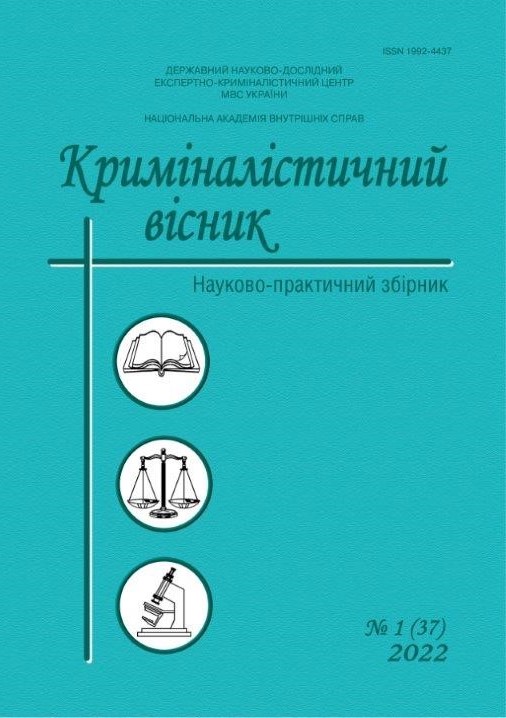INNOVATIVE DIRECTION OF EXPANSION EVIDENTIAL BASE OF FORENSIC EXAMINATION
DOI:
https://doi.org/10.37025/1992-4437/2022-37-1-7Keywords:
principles of judicial expert activity, Social sciencies, innovative directions, evidence base of forensic examination, sociological research, trading adjustmentAbstract
The purpose of the article is to scientifically substantiate and search for innovative directions for ensuring the
basic principles of forensic expert activity – objectivity and completeness of the study, by expanding the quantitative
and qualitative segment of the complex of evidence base of modern forensic examination through a combination of
modern techniques and methods of the social sciences of sociology and law. Methodology. The reliability of the results
and conclusions of this study is ensured by using a complex of general scientific (analysis and synthesis, induction and
deduction, analogy and modeling, abstraction and concretization, system analysis) and special methods of cognition
(thought experiment, idealization, formalization, generalization, convergence). Scientific novelty. For the first time
in the domestic practice of forensic examination, the objective necessity, technical feasibility and practical feasibility
of improving the quantitative and qualitative structural elements of the forensic evidence base complex by applying
innovative areas of the sociological research method are scientifically substantiated. Conclusions. Certain provisions
of law and sociology as social sciences are considered, the content of the laws of Ukraine "On Forensic Science" and
«On Information» is analyzed, and on the basis of this it is established that the modern evidence base of forensic
science can be improved by modernizing its quantitative and qualitative structural elements with the help of tools
and methods of modern social sciences. It is stated that it is advisable to improve the quantitative component of
the evidence base of forensic examinations by increasing its nomenclature, using information obtained as a result
of sociological research, since sociological information has the status of an innovative development factor in legal
circles. It is advisable to improve the qualitative component of the evidence base of forensic examinations through
modernization, using a combined method of collecting sociological information – questionnaires and telephone
surveys and documenting the process of collecting information, respectively, on two complementary media – paper
and digital. It has been proved that the combination of printed and electronic components of each questionnaire will
allow using questionnaires as an innovative and operational method of obtaining primary information about the
objective aspects of the process under study. It is substantiated that in order to fix the bargaining process, document it
in electronic form and obtain the necessary factual data on the numerical values of the results of the bargaining process,
it is advisable to use information collection known in sociology and widespread among social monitoring professionals
– telephone surveys. The basic criteria for a telephone survey and a questionnaire have been developed as methods for
collecting social information and data sources to improve the qualitative parameters of the evidence base for forensic
examinations. The dual role and two-level significance of the evidence base of forensic examination are established:
at the stage of forensic examination – the evidence base is the foundation of this forensic examination (primary role
and level of significance); executed, completed forensic examination – becomes a key factor in the evidence base of
legal proceedings (secondary role and second level of significance). It is confirmed that the results obtained deepen the
methodological, legal and practical issues of forensic examination, which contribute to the development of the expert
and evidence base of forensic examination through modernization through the expansion of its spectrum in terms of
quantitative and qualitative structural elements using the tools and methods of modern social sciences. The results of
scientific and research work have proved that the scientific, theoretical and practical problem of forming an evidence
base when establishing the numerical values of the bargaining adjustment coefficients for use in forensic merchandise
examination requires additional research into the evidence base of forensic examinations.



